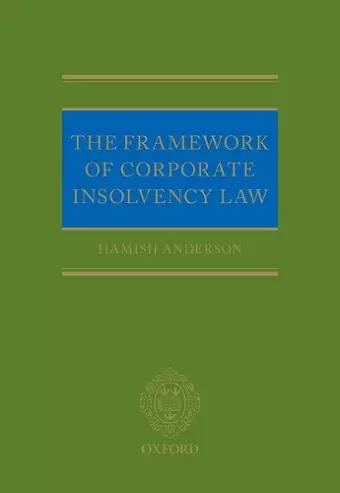The Framework of Corporate Insolvency Law
Format:Hardback
Publisher:Oxford University Press
Published:11th May '17
Currently unavailable, and unfortunately no date known when it will be back

This book provides a critical examination of modern English corporate insolvency law, in particular the procedures under the Insolvency Act 1986, from both conceptual and functional points of view. It focuses throughout on identifying a rational explanation for the form that the rules and institutions of the modern law take or, where there is no such rational explanation, the history which has resulted in the present position. A central theme of the book is that the nature and fundamental purpose of insolvency proceedings themselves dictate many of the features of English insolvency proceedings. For example, collective execution on behalf of creditors necessitates definition of the insolvent estate and the provision of rules concerning provable debts and transaction avoidance. Many key features of the insolvency procedures are therefore essentially matters of practicality rather than principle, albeit practicalities applied justly and fairly. The book covers the nature and purpose of insolvency law; the procedures; the administration, supervision and regulation of insolvency proceedings; the insolvent estate and transaction avoidance; investigation and wrongdoing by directors; phoenixism and pre-packing; distribution of the insolvent estate; and, lastly, cross-border insolvency. It examines the various principles of insolvency law in the context of practice, drawing upon historical perspectives where appropriate. By explaining how the law takes the form that it does, the book promotes an understanding of the present law and institutions as a whole, and shows how this understanding might inform future developments.
This book is ... of interest to both academics and practitioners, as well as to any persons who have a true interest in investigating the structure of the existing insolvency system and in questioning its adequacy for the new challenges of the 21st century. * Eugenio Vaccari, International Company and Commercial Law Review *
In my view this scholarly, yet practical, book should be required reading for all insolvency practitioners. * Chris Laughton, Mercer & Hole (R3's Recovery Magazine, Spring 2018) *
The book has a clear structure and is well written. Its concise style and short chapters make it accessible to the reader. It is up to date, reflecting the recent legislative changes to both UK and EU insolvency law and brings a wealth of experience to the discussion. It is this, coupled with the depth of its coverage, that makes this an invaluable text for academics and practitioners alike. * Dr Paula Moffatt, Nottingham Law School (Eurofenix, Winter 2017/18) *
An invaluable work with which no serious practitioner or scholar should be unfamiliar * Joe Bannister, Partner, Hogan Lovells (Global Restructuring Review, Sep 2017) *
...this is a valuable book, which all practitioners in corporate insolvency law should read and consult. I foresee that it will often be used in crafting written submissions to the court. As a result, Hamish's concise and accurate explanation of the law may become embedded in judgments and thus part of our corporate insolvency law. * Simon Mortimore QC (South Square Digest, Sep 2017) *
Anderson does an excellent job in eviscerating the rationale that underpins the law while making constant reference to detailed statutory provisions. This is one of the rare cases in which the reader obtains both a holistic and an analytical understanding of the covered topics. * Eugenio Vaccari, City, University of London (International Company and Commercial Law Review, 2017) *
The approach is both insightful and practical and should certainly pique the interest of practitioners specialising in this field in which much has happened over the past forty or so years. * Elizabeth Taylor of Richmond Green Chambers and Phillip Taylor MBE, Head of Chambers *
Anderson has set out to write a book that he wished he had had to hand when he started his journey. To take away any uncertainty, I think he past [sic] his self-imposed task gloriously. Practitioners as well as scholars will not be disappointed with the meal served by the author. He typically looks at themes and matters in a more functional, practical way, which Anderson deals with in 22 Chapters. * Prof. Dr. Bob Wessels *
ISBN: 9780198805311
Dimensions: 248mm x 181mm x 26mm
Weight: 766g
352 pages